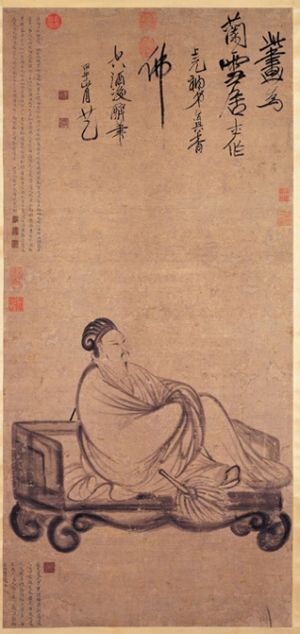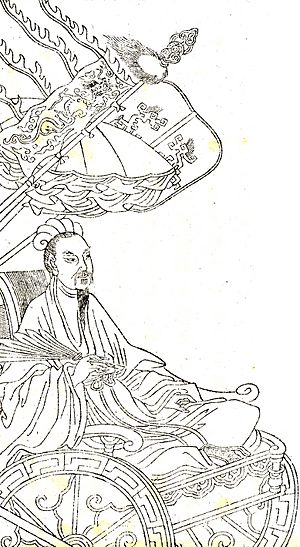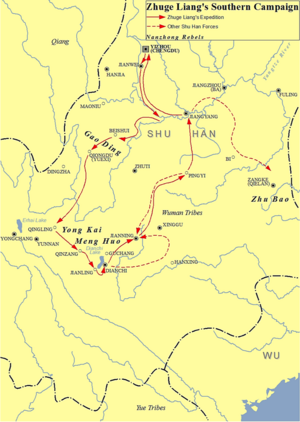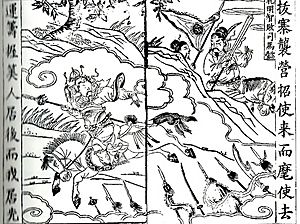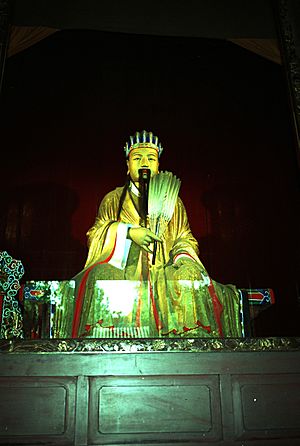Zhuge Liang facts for kids
Quick facts for kids
Zhuge Liang
|
|
|---|---|
|
諸葛亮
|
|
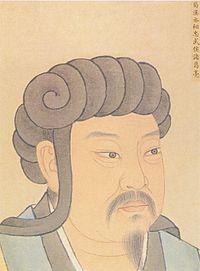
An illustration of Zhuge Liang
|
|
| Imperial Chancellor (丞相) of Shu Han | |
| In office 229–234 |
|
| In office 221–228 |
|
| Monarch | Liu Bei / Liu Shan |
| General of the Right (右將軍) | |
| In office 228–229 |
|
| Monarch | Liu Shan |
| Governor of Yi Province (益州牧) | |
| In office 223–234 |
|
| Monarch | Liu Shan |
| Colonel-Director of Retainers (司隸校尉) | |
| In office 221–234 |
|
| Monarch | Liu Bei / Liu Shan |
| Preceded by | Zhang Fei |
| Manager of the Affairs of the Masters of Writing (錄尚書事) | |
| In office 221–234 |
|
| Monarch | Liu Bei / Liu Shan |
| Military Advisor General (軍師將軍) (under Liu Bei) |
|
| In office 214–? |
|
| Monarch | Emperor Xian of Han |
| Military Advisor General of the Household (軍師中郎將) (under Liu Bei) |
|
| In office 208–? Serving with Pang Tong (210–214)
|
|
| Monarch | Emperor Xian of Han |
| Personal details | |
| Born | 181 Yangdu County, Langya Commandery, Han Empire (present-day Yinan County, Shandong) |
| Died | c.September 234 (aged 53) Wuzhang Plains, border of Shu Han and Cao Wei (present-day Qishan County, Shaanxi) |
| Resting place | Mount Dingjun, Shaanxi |
| Spouse | Lady Huang |
| Children |
|
| Parent |
|
| Relatives |
|
| Occupation | Statesman, military strategist |
| Courtesy name | Kongming (孔明) |
| Posthumous name | Marquis Zhongwu (忠武侯) |
| Peerage | Marquis of Wu District (武鄉侯) |
| Nickname(s) | "Crouching Dragon" (臥龍/伏龍) |
| Zhuge Liang | |||||||||||||||||||||||||||||||||||||||||||
|---|---|---|---|---|---|---|---|---|---|---|---|---|---|---|---|---|---|---|---|---|---|---|---|---|---|---|---|---|---|---|---|---|---|---|---|---|---|---|---|---|---|---|---|
| Traditional Chinese | 諸葛亮 | ||||||||||||||||||||||||||||||||||||||||||
| Simplified Chinese | 诸葛亮 | ||||||||||||||||||||||||||||||||||||||||||
| Hanyu Pinyin | PRC Standard Mandarin: ROC Standard Mandarin: Zhūgé Liàng |
||||||||||||||||||||||||||||||||||||||||||
|
|||||||||||||||||||||||||||||||||||||||||||
| Kongming (courtesy name) |
|||||||||||||||||||||||||||||||||||||||||||
| Chinese | 孔明 | ||||||||||||||||||||||||||||||||||||||||||
| Hanyu Pinyin | Kǒngmíng | ||||||||||||||||||||||||||||||||||||||||||
|
|||||||||||||||||||||||||||||||||||||||||||
Zhuge Liang (born 181, died September 234), also known by his courtesy name Kǒngmíng, was a very smart Chinese statesman and military leader. He served as the top advisor, called a chancellor, and later as a regent for the state of Shu Han. This was during a time in China's history known as the Three Kingdoms period.
Many people consider Zhuge Liang to be the most skilled strategist of his time. Some even compare him to Sun Tzu, who wrote The Art of War. Even when he lived quietly, his fame as a wise and educated person grew. This earned him the nickname "Wolong" or "Fulong," which means "Crouching Dragon" or "Sleeping Dragon." You'll often see Zhuge Liang shown wearing a special Taoist robe and holding a hand fan made of crane feathers.
Zhuge Liang followed ideas from Confucianism and Legalism. He liked to compare himself to famous wise ministers like Guan Zhong and Yue Yi. He worked hard to improve farming and businesses in Shu. He also believed in strict, fair laws and didn't let rich families take advantage of others. Because of his good leadership, people built shrines to him. Today, his name is a symbol of wisdom and clever plans in Chinese culture.
Contents
Early Life and Education
Zhuge Liang was born in 181 in Yangdu County, which is now part of Shandong Province. His family name, Zhuge, has two characters. His father died when he was young, so his cousin's relative, Zhuge Xuan, raised him. In 195, Zhuge Liang moved with Zhuge Xuan to live with a friend, Liu Biao, who was a governor.
Zhuge Liang grew up to be a tall man. He enjoyed singing a folk song called Liangfu Yin. He often compared himself to famous wise leaders like Guan Zhong and Yue Yi. Not many people took him seriously at first. But he became good friends with important thinkers like Xu Shu and Sima Hui. Sima Hui even called him a "sleeping dragon."
Zhuge Liang married the daughter of Huang Chengyan. Huang Chengyan told him, "I have a daughter who isn't pretty, but she is very smart." Zhuge Liang agreed to marry her.
Serving Liu Bei
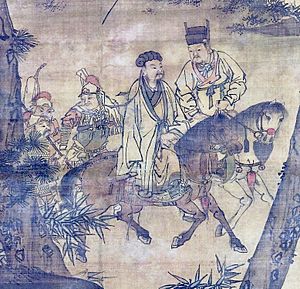
When Liu Bei was staying in Xinye County, he visited Sima Hui. Sima Hui told him, "Only the 'Crouching Dragon' and 'Young Phoenix' truly understand what's happening." He was talking about Zhuge Liang and Pang Tong.
Later, Xu Shu also told Liu Bei about Zhuge Liang. Liu Bei wanted Xu Shu to invite Zhuge Liang to meet him. But Xu Shu said, "You must go and visit him yourself. He won't come to you." So, Liu Bei visited Zhuge Liang three times in 207 to convince him to join his team. This story is very famous in China and is called "Three visits to the cottage."
Zhuge Liang then shared his "Longzhong Plan" with Liu Bei. This plan was about how Liu Bei could build his own state. After this, Liu Bei and Zhuge Liang became very close. Liu Bei's other generals, Guan Yu and Zhang Fei, were not happy about this at first. But Liu Bei explained, "Having Kongming is like a fish finding water. I hope you will stop complaining." After that, they understood.
A Skilled Diplomat
In 208, Liu Biao died, and his son, Liu Cong, gave up his land to Cao Cao. Liu Bei had to leave with his people. He sent Zhuge Liang to meet Sun Quan in Jiangdong. Zhuge Liang's job was to convince Sun Quan to form an alliance with Liu Bei against Cao Cao.
Zhuge Liang understood Sun Quan's personality. He told Sun Quan that even though Liu Bei was weaker than Cao Cao, he would never surrender. He also pointed out that Cao Cao's army had weaknesses. Sun Quan was impressed by Zhuge Liang's arguments. He agreed to join forces with Liu Bei. This alliance led to the famous Battle of Red Cliffs.
Managing Supplies and Resources
After the Battle of Red Cliffs, Liu Bei and Sun Quan won a big victory. Liu Bei then took control of more land. Zhuge Liang was put in charge of managing several areas and collecting taxes. This money was used to pay for the army.
In 211, Liu Bei went to attack a warlord named Zhang Lu. Liu Bei left Zhuge Liang and other generals to guard Jing Province. Liu Bei secretly planned to take over Liu Zhang's land. When Liu Zhang found out, they went to war. Zhuge Liang, Zhang Fei, and Zhao Yun led troops to help Liu Bei. In 214, Liu Zhang surrendered, and Liu Bei took control of Yi Province.
Liu Bei made Zhuge Liang a Military Advisor General. Zhuge Liang stayed in Chengdu to make sure the army always had enough soldiers and supplies. In 221, Liu Bei became the ruler of Shu Han. He made Zhuge Liang his chancellor, which was a very important position.
Serving Liu Shan
In 223, Liu Bei became very sick after a battle. He called Zhuge Liang to him and said, "You are much more talented than Cao Pi. You can protect our country and achieve our goals. If my son, Liu Shan, can be helped, please help him. If he is not capable, then you may take over the throne." Zhuge Liang promised to serve with loyalty until his death. Liu Bei then told his son, Liu Shan, to listen to Zhuge Liang as if he were his own father.
After Liu Bei died, Liu Shan became the new emperor of Shu Han. He gave Zhuge Liang the title "Marquis of Wu District." Zhuge Liang became both the Chancellor and the governor of Yi Province. This meant he was in charge of almost everything in Shu Han. He managed government officials and the common people. The emperor, Liu Shan, mostly followed Zhuge Liang's advice and was guided by him.
Improving the Economy
Before Zhuge Liang took charge, rich families in Yi Province were taking advantage of the common people. Many people were poor. Zhuge Liang knew that a strong economy was needed to make the people loyal and to support future wars. So, his main goal was to make people's lives better.
Zhuge Liang removed corrupt officials and lowered taxes. He also stopped rich families from abusing their power. He made sure that forced labor and military service didn't stop farmers from growing food. He also improved irrigation systems, like the famous Zhuge dyke. Because of these changes, Shu Han's farming grew a lot.
Zhuge Liang also focused on salt production, silk making, and steelmaking. He created special offices to manage these industries. Chengdu became known as "the city of Silk." Salt production brought a lot of money to the government. He also supported people who improved steel weapons for the army. Silk production grew so much that Shu Han had 200,000 pieces of silk saved up.
Zhuge Liang also fixed the money system, which was a big problem at the end of the Han dynasty. The new money he introduced worked well in Shu Han and even in nearby areas.
Fair Laws and Good Conduct
Zhuge Liang strongly believed in the rule of law. He helped write the legal codes for Shu Han. He made sure laws were strict but fair and clear. He punished high-ranking officials, even his close friends, if they broke the law. He even demoted himself once to show that everyone must follow the rules.
Zhuge Liang also set a good example by living a simple life. He didn't have too many possessions and didn't spend money on luxuries. Other officials in Shu Han followed his example. This made the government very honest and trustworthy.
Some people didn't like Zhuge Liang's strict policies, especially the rich families who couldn't abuse their power anymore. But most people were happy because the laws were fair.
Education and Finding Talent
Zhuge Liang believed in finding and training talented people for the government. He created positions and facilities to encourage learning. He set up "reading book residences" where people could discuss different topics. This helped him find smart people to work for Shu Han. He promoted people based on what they could do, not on their family name or fame.
Working with Eastern Wu
After Liu Bei's death, some areas in the south rebelled. Zhuge Liang didn't send troops right away because he wanted to make peace with Eastern Wu. He sent diplomats to rebuild the alliance. He always sent people to Wu to keep their relationship strong.
In 229, Sun Quan declared himself emperor. Many officials in Shu Han were angry because they thought only their emperor, who was a descendant of the Han dynasty, had the right to be emperor. Some wanted to end the alliance with Wu. But Zhuge Liang said the alliance was still important. So, Shu Han sent someone to congratulate Sun Quan and keep the peace.
Southern Campaign
Zhuge Liang's main goal for Shu Han was to bring back the Han dynasty. He believed that to attack the state of Cao Wei in the north, Shu Han first needed to be completely united. He was worried that local groups in the south might rebel. So, in 225, Zhuge Liang led an army to the south to calm the tribes there.
His advisor, Ma Su, suggested that they should try to win the hearts of the southern tribes instead of just fighting them. Zhuge Liang listened to this advice. He defeated the rebel leader, Meng Huo, seven times. Each time, he released Meng Huo. This was to show kindness and make Meng Huo truly surrender.
Meng Huo finally gave up and promised loyalty to Shu Han. Zhuge Liang made him the governor of the region. This helped keep the southern border safe. The rich resources from the south also helped fund Shu Han's army and made the state stronger.
Northern Expeditions and Death
After making peace in the south, Zhuge Liang prepared his army to attack Wei. In 227, he wrote a famous letter to Liu Shan, called Chu Shi Biao. In it, he explained why they needed to fight Wei and gave advice on how to rule well.
From 228 until his death in 234, Zhuge Liang launched five "Northern Expeditions" against Wei. Most of these attacks were not successful. During the first expedition, he convinced a young Wei officer named Jiang Wei to join Shu Han. Jiang Wei later became an important general and continued Zhuge Liang's policy of attacking Wei.
Zhuge Liang's first attack surprised Cao Wei. However, Shu Han's troops lost a key battle, which caused the whole expedition to fail. Zhuge Liang punished the general responsible and even demoted himself. In later expeditions, Shu Han gained some small territories and moved some Wei citizens to Shu.
Zhuge Liang worked hard to solve the problem of supplying his army far from home. He improved inventions like the "wooden ox" and "flowing horse" to carry supplies. He also built huge storage facilities and grew food in the northern areas.
In 234, Zhuge Liang launched his last expedition. His army camped at Wuzhang Plain. The Wei general, Sima Yi, decided to play it safe and just defend. Zhuge Liang tried to provoke Sima Yi into fighting, but it didn't work. Zhuge Liang worked tirelessly on military matters. He became very sick and died in his camp at the age of 53. Before he died, he named Jiang Wan and Fei Yi to take over his role.
When Sima Yi heard that Zhuge Liang had died and the Shu army was leaving, he chased after them. But the Shu army pretended to counterattack. This tricked Sima Yi into thinking Zhuge Liang was still alive and had planned a trap. Sima Yi stopped his pursuit, and the Shu army got away safely. This led to the saying, "A dead Zhuge (Liang) scared away a living Zhongda (Sima Yi's courtesy name)."
Burial and Legacy
Zhuge Liang wanted a simple funeral. He was buried on Mount Dingjun in a modest tomb, without expensive materials. Liu Shan gave him the special title "Marquis Zhongwu," meaning "loyal and martial marquis." Zhuge Liang had promised Liu Shan that he would live a simple life as an example. After his death, his property was checked, and it was found that he had kept his promise.
People in Shu Han were very sad when Zhuge Liang died. Later, a temple was built for him in Mianyang, near his tomb.
Family and Relatives
Zhuge Liang came from a family with a history of serving the government. His father was an assistant officer. His cousin's relative, Zhuge Xuan, raised him.
Zhuge Liang had an older brother, a younger brother, and two older sisters. His older brother, Zhuge Jin, worked for the warlord Sun Quan in the state of Eastern Wu. His younger brother, Zhuge Jun, served in Shu Han. One sister married a cousin of Pang Tong, and the other married into a famous family.
Zhuge Liang married the daughter of Huang Chengyan. Her name is not recorded, but she is often called "Huang Yueying" in stories.
Zhuge Liang had at least two sons. His older son, Zhuge Zhan, was a general in Shu and died in battle. His younger son, Zhuge Huai, lived a normal life. Since Zhuge Liang didn't have a son at first, he adopted his nephew, Zhuge Qiao. Zhuge Qiao also served in Shu but died young.
One of Zhuge Liang's cousins, Zhuge Dan, served in the state of Cao Wei. He led a rebellion but was defeated and killed.
Inventions and Writings
People often say Zhuge Liang invented the repeating crossbow, but he actually just improved it. He is also credited with building the Stone Sentinel Maze, which is a special arrangement of stones.
An early type of hot air balloon, used for sending signals in war, is called the Kongming lantern after him. It is said he invented it to signal for help when he was trapped.
Some books are said to be written by Zhuge Liang, like the Thirty-Six Stratagems. His writings on military tactics, based on the I Ching, were thought to be unmatched. His letter, the Chu Shi Biao, written before his northern campaigns, shows his strong loyalty to Shu. It is said to have made some readers cry. He also wrote Admonition to His Son, where he talked about living a humble and simple life.
Zhuge Liang is also a popular subject in Chinese poems. The famous Tang dynasty poet Du Fu wrote poems remembering Zhuge Liang.
Famous Sayings
Many famous phrases come from Zhuge Liang's writings.
- "The Han and the Evil do not stand together" means you cannot be with evil.
- "With deference and prudence, to the state of one's depletion; it's never finished until one's death" describes someone who works with extreme dedication until they die.
- "Without modest simplicity, one cannot brighten volition; Without tranquility and serenity, one cannot reach far" is a well-known saying about how to be wise and achieve great things.
In Romance of the Three Kingdoms
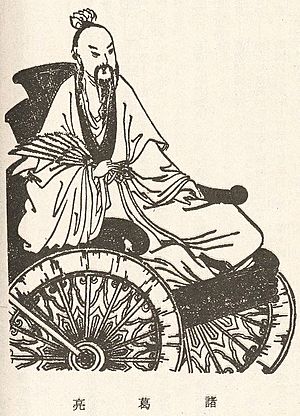
Zhuge Liang's wisdom became even more famous through the historical novel Romance of the Three Kingdoms. In this book, he is shown doing amazing things, like calling for special winds or creating magical stone mazes.
It can be confusing to know what parts of his story are real history and what are fiction. For example, the Empty Fort Strategy is based on history, but it wasn't originally credited to Zhuge Liang. For many Chinese people, it doesn't matter if the stories are real or not. Zhuge Liang is seen as a super-smart leader whose ideas still influence Chinese thinking today.
Here are some famous stories about Zhuge Liang from Romance of the Three Kingdoms:
- Three visits to the thatched cottage
- Borrowing arrows with straw boats
- Zhuge Liang summons an eastern wind
- Meng Huo captured and released seven times
- Empty fort strategy
In the novel, when Zhuge Liang was dying, he tried a ritual to live longer. But it was interrupted, and he failed. Before he died, he passed on his military strategies to Jiang Wei, who continued his fight against Wei.
Worship and Temples
Many temples and shrines have been built to honor Zhuge Liang. Some of the most famous are the Temple of the Marquis of Wu in Chengdu and the Temple of the Marquis of Wu in Baidicheng.
-
Temple of the Marquis of Wu in Baidicheng, Fengjie County, Chongqing.
In 760, an emperor built a temple to honor Jiang Ziya. He placed sculptures of Zhuge Liang and nine other famous military leaders next to Jiang Ziya's statue. Zhuge Liang is also sometimes seen as a door god in Chinese and Taoist temples, often with Sima Yi.
See also
 In Spanish: Zhuge Liang para niños
In Spanish: Zhuge Liang para niños
- Lists of people of the Three Kingdoms
- Wolonggang
- Zhuge Village
 | May Edward Chinn |
 | Rebecca Cole |
 | Alexa Canady |
 | Dorothy Lavinia Brown |


